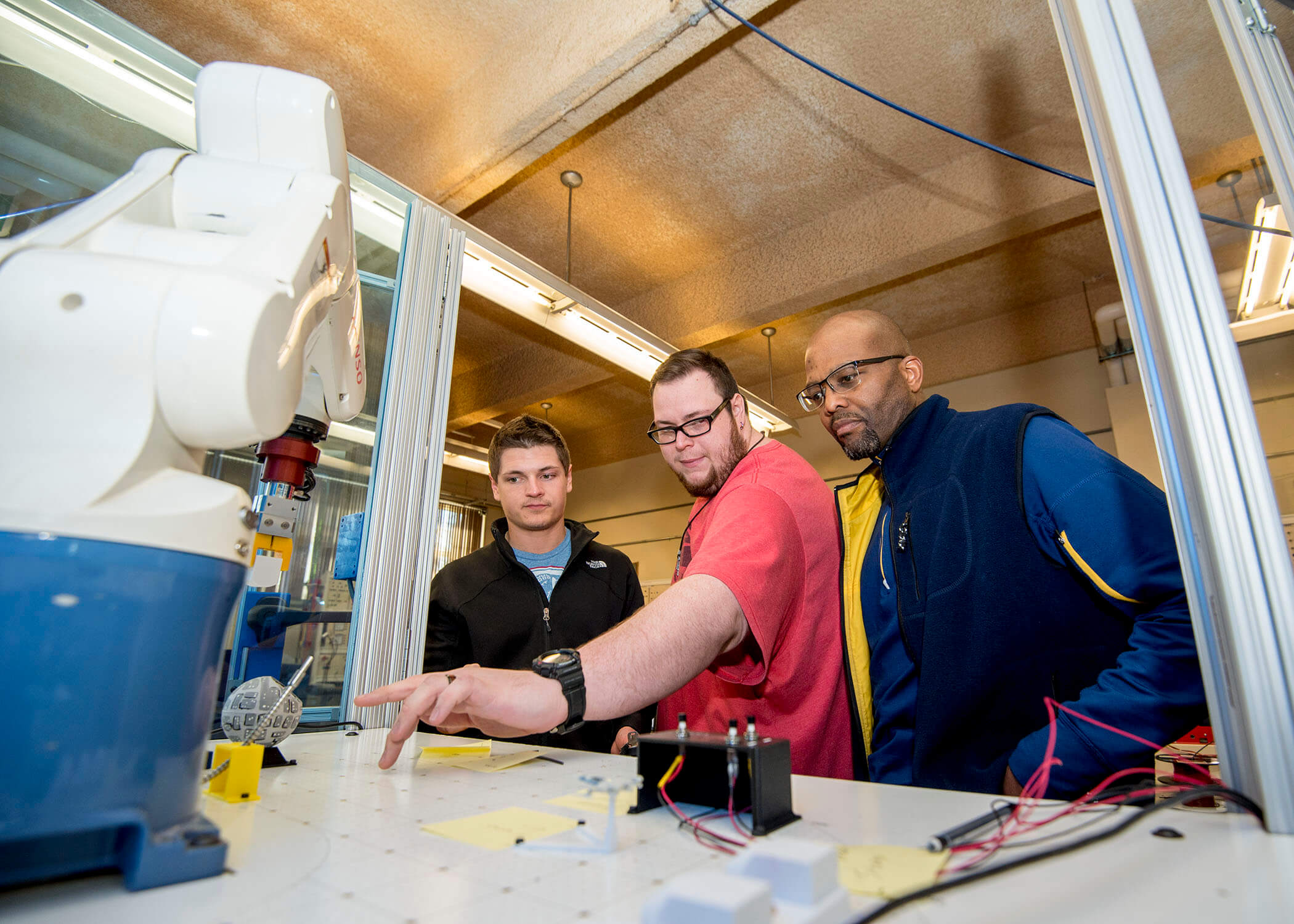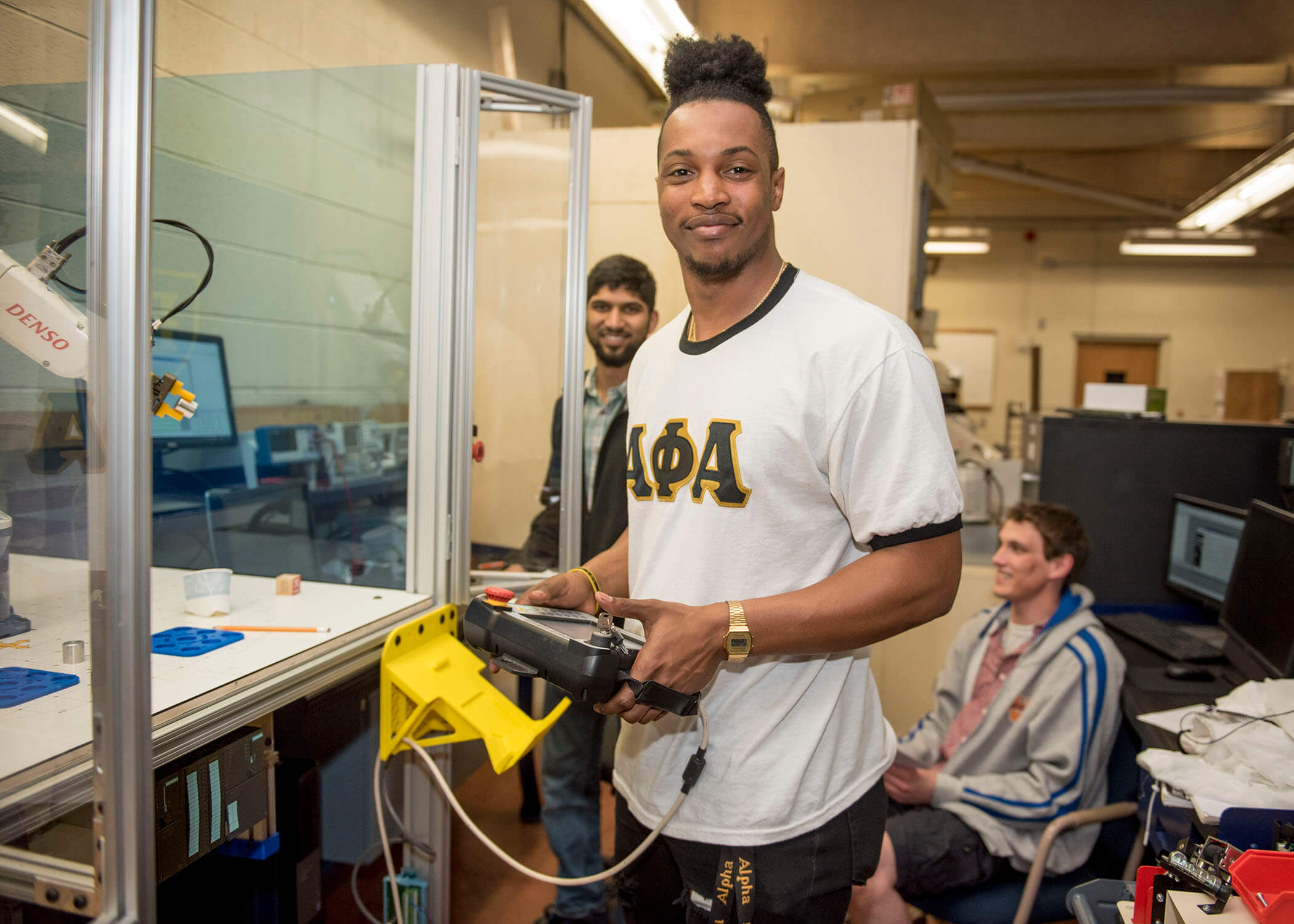The Bachelor of Science in Engineering Technology – Electronics concentration combines scientific and engineering knowledge and methods into technical classes to provide students the knowledge base to support engineering activities. An electronic engineering technologist is a person who is knowledgeable in design and electronics theory and who understands state-of-the-art practices related to communications, controls and automation, digital and analog circuits and systems, instrumentation, and robotics. Students in this program complete extensive lab work, preparing them with skills needed in many industrial and manufacturing settings.
Concentration Overview
Goals
Outcomes
An Electronics Engineering Technologist (EET) is a person who is knowledgeable in electronics theory and design and who understands state-of-the-art practices related to controls and automation, digital and analog circuits and systems, communications, instrumentation, and robotics. The EET program at ETSU requires an extensive lab component that gives students experience to start immediately in an industrial or manufacturing setting. Our students participate in labs that provide exposure to 208VAC 3 phase power, communications, digital signal processors, industrial motor control, instrumentation, process control, and robotics as well as labs on the fundamental concepts of electronics.
The program prepares students for entry into the technical workforce. In particular, the department strives to ensure that its graduates have an ability to:
- Apply knowledge of science, mathematics, and engineering.
- Be able to communicate effectively.
- Design, and conduct experiments as well as analyze and interpret data.
- Function effectively in teams.
- Identify, formulate, and solve engineering problems.
- Possess an understanding of professional and ethical standards.
- Use existing technologies related to systems, components, or processes to meet employer needs.
The Bachelor of Science Degree in Electronics Engineering Technology program is accredited by the Engineering Technology Accreditation Commission of ABET, https://www.abet.org, under the General Criteria.
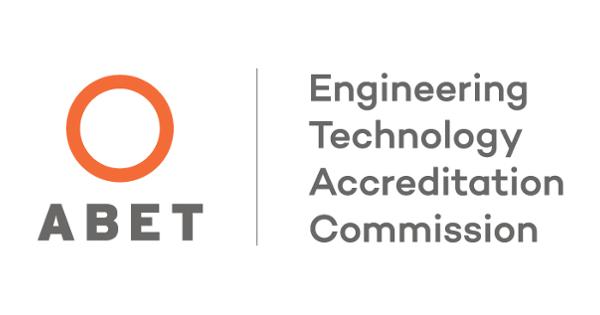
Student Outcomes – Engineering Technology Programs
Electrical Engineering Technology students are expected to have demonstrated proficiency in the following areas: at graduation:
- An ability to apply knowledge, techniques, skills and modern tools of mathematics, science, engineering, and technology to solve broadly-defined engineering problems appropriate to the discipline;
- An ability to apply written, oral, and graphical communication in broadly-defined technical and non-technical environments; and an ability to identify and use appropriate technical literature;
- An ability to conduct standard tests, measurements, and experiments and to analyze and interpret the results to improve processes
- An ability to design systems, components, or processes meeting specified needs for broadly-defined engineering problems appropriate to the discipline; and
- An ability to function effectively as a member as well as a leader on technical teams.
Program Specific Outcomes Criteria – Electronics Engineering Technology
IEEE has established program criteria for Electrical Engineering Technology; and students at graduation will show competence in the following curricular areas:
- The ability to analyze, design, and implement one or more of the following: control systems, instrumentation systems, communications systems, computer systems, or power systems;
The ability to apply project management techniques to electrical/electronic(s) systems;
The ability to utilize differential and integral calculus, as a minimum, to characterize the performance of electrical/electronic systems.
The application of circuit analysis and design, computer programming, associated software, analog and digital electronics, and microcomputers, and engineering standards to the building, testing, operation, and maintenance of electrical/electronic(s) systems; and
The application of natural sciences and mathematics at or above the level of algebra and trigonometry to the building, testing, operation, and maintenance of electrical/electronic systems;
Also the EET program has established Program Education Objectives for our students as follows:
- To produce graduates that possess the technical and professional skills to have successful careers in regional, state or national industries related to their discipline.
- To pursue life-long learning so the EET graduates can become the technical experts, technical advisors, or technical managers in their profession.
Curriculum
To graduate from ETSU with a degree in Electronics Engineering Technology a student must complete a total of 128 hours. These hours contain:
-
ELECTRONIC CONCENTRATION
- CHEM 1110 General Chemistry Lecture
- CHEM 1111 General Laboratory I
- ENTC 2310 Electrical Principles
- ENTC 2320 Electronics I
- ENTC 3310 Circuit Analysis
- ENTC 3320 Electronics II
- ENTC 3370 Electronics-Digital Circuits
- ENTC 4037 Quality Assurance I
- ENTC 4310 Electronics Communications
- ENTC 4337 Microprocessors
- Advisor Approved Elective (3-4 Credits)
-
Electronic Electives
Choose 9-10 credits from the following:
- ENTC 3340 Electrical Machinery
- ENTC 3350 Industrial Electronics
- ENTC 4227 Engineering Economy
- ENTC 4390 Medical Imaging Equipment Technology
- ENTC 4517 Industrial Automation and Robotics
- MATH 2010 Linear Algebra
-
General Education
- ENGL 1010 Foundations in Writing
- ENGL 1020 Written Communication & Critical Thinking
- Oral Communication (choose 1)
- Literature (choose 1)
- Fine Arts Elective (choose 1)
- ENTC 3020 Technology & Society
- Social and Behavioral Sciences (choose 2)
- HIST 2010 The United States to 1877
- HIST 2020 The United States since 1877
- MATH 1530 Probability and Statistics – Non-calculus
- PHYS 2010 General Physics I Non-calculus
- PHYS 2011 General Physics Laboratory I Non-calculus
- PHYS 2020 General Physics II Non-calculus
- PHYS 2021 General Physics Laboratory II Non-calculus
- CSCI 1100 Using Information Technology
-
Specialty Electives
Select (1) one area of courses to complete 11 credits:
General:
ENTC 2510 Introduction to Robotic- ENTC 4237 Ergonomics and Process Optimizatio
- ENTC 4277 Instrumentation and Process Contro
- ENTC 4347 Digital Signal Processor
- Instrumentation & Automation
- ENTC 2510 Introduction to Robotic
- ENTC 4277 Instrumentation and Process Contro
- ENTC 4237 Ergonomics and Process Optimization
Telecommunications:
- ENTC 2330 Network Systems
- ENTC 4307
- ENTC 4347 Digital Signal Processors
- Culminating Experience: 4 Credits
- ENTC 4600 Technical Practicum
-
Technology core Requirements
- ENTC 1510 Student in University
- ENTC 2170 Computer - Aided Design and Drafting (CADD)
- ENTC 3030 Technical Communication
- ENTC 4017 Industrial Supervision
- ENTC 4060 Project Scheduling
- METC 1140 Fundamentals of Engineering Analysis
- MATH 1910 Calculus I
- MATH 1920 Calculus II
Enrollment and Graduation Data
| Academic Year | Enrollment | Graduation |
| 2018-2019 | 51 | 5 |
| 2017-2018 | 39 | 7 |
| 2016-2017 | 44 | 6 |
Faculty
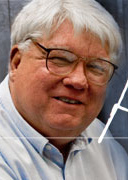
Dr. Hugh Blanton
Professor Emeritus: Biomed: Biomedical and ElectronicsEngineering, Engineering Technology, Interior Architecture & Surveying
- blanton@etsu.edu
- (423) 439-7822
- 222A Wilson-Wallis Hall
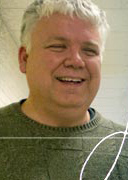
Dr. Paul Sims
Program Coordinator Graduate Coordinator Professor: Electronics and ManufacturingEngineering, Engineering Technology, Interior Architecture & Surveying
- simsj@etsu.edu
- (423) 439-7819
- 213B Wilson-Wallis Hall

David Zollinger
Senior Lecturer: Electronics and ManufacturingEngineering, Engineering Technology, Interior Architecture & Surveying
- zollinger@etsu.edu
- (423) 439-7582
- 111A Wilson-Wallis Hall
Engineering Electronics Advisory Committee |
||
| First Name | Last Name | Organization |
| Michael | Cassell | Siemens Inc. |
| Matt | Raby | Jtek Inc. |
| Dwaine | Raper | UT Center for Undustrial Studies |
| Guy | McAmis | Consultant |
| Stephen | Smith | Eastman Inc. |
| David | Ward | ORNL |
| Garth | Ghearing | U.S. Army |
| Tim | Coleman | IES Inc. |
| Kenny | Smith | UT Center for Industrial Studies |
| Brandyn | Hoffer | Denso-DIAM |
| Chaitra | Bommegowda | MC Dean Inc. |
| Kevin | Mainini | ORNL |
| Ali | Memon | Denso-DIAM |
| Travis | Carter | FEMA |
 South Dossett Drive - Closure...
South Dossett Drive - Closure... 